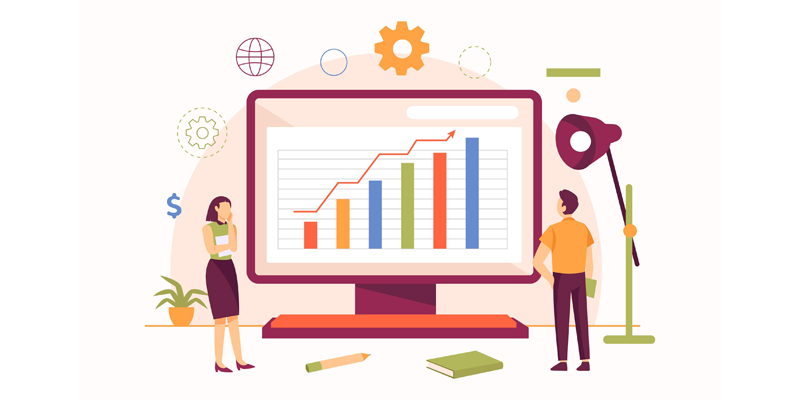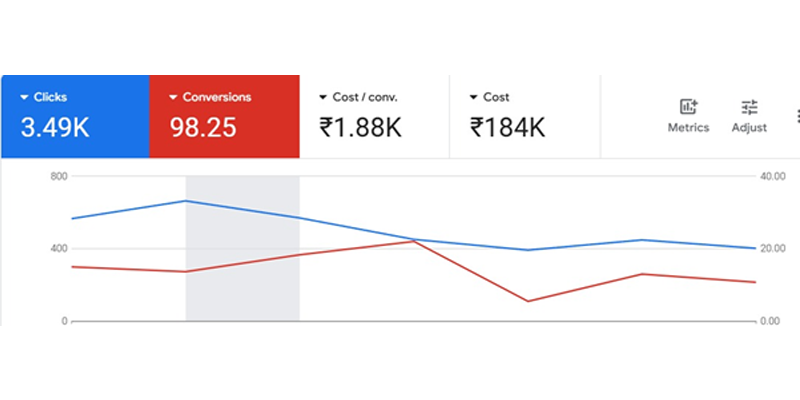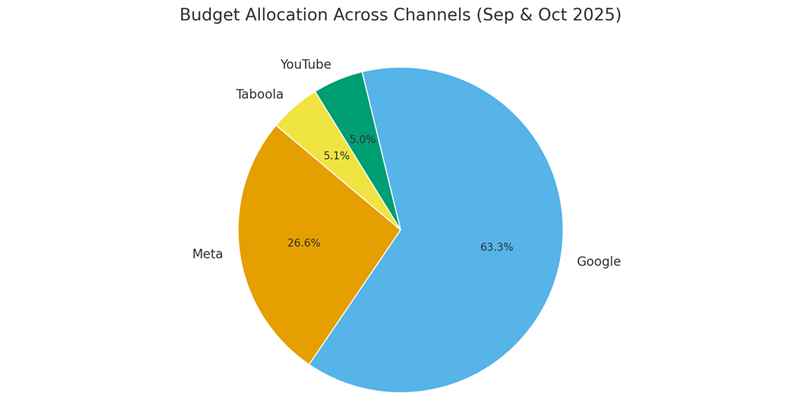

Increased visibility, brand awareness, and market reach
Digital marketing levels the playing field, enabling SMEs to compete with larger players by leveraging cost-effective online channels. According to insights from Investopedia and SRV Media, a well-executed digital strategy can increase brand recall by up to 80% compared to offline media. Search engine optimisation (SEO) ensures visibility where customers are actively searching, while social media campaigns expand reach across demographics. For businesses targeting growth in saturated markets, digital channels act as the most scalable visibility engine.
Lead generation, sales growth, and ROI
At its core, digital marketing converts attention into revenue. Data from Investopedia emphasizes that companies using targeted campaigns often achieve higher conversion rates at lower costs compared to traditional media. Performance marketing models like PPC ensure that businesses only pay when measurable results — clicks, leads, or purchases — are delivered, directly linking spend to outcomes.
Customer engagement, loyalty, and retention
As SRV Media highlights, digital channels provide two-way communication, building relationships beyond the first transaction. Personalized content, loyalty campaigns, and retargeting strategies keep customers engaged. Businesses investing in customer experience-driven digital marketing often see a 25–30% improvement in retention rates, proving that long-term growth depends not only on acquisition but also on keeping customers loyal.
Digital transformation reshapes how SMEs operate, and digital marketing is at the heart of this change. As highlighted in ResearchGate’s analytical study, transformation means more than adopting digital tools — it’s about rethinking processes to make data, technology, and customer insights central to decision-making.
For SMEs, this means shifting from instinctive, traditional advertising to data-driven marketing ecosystems. Cloud-based CRMs, AI-driven analytics, and automation platforms empower small businesses to manage campaigns with the same sophistication as large corporations. The mediating role of technology investment and infrastructure is critical: without proper digital foundations — from websites optimised for conversions to integrated analytics dashboards — businesses risk falling behind competitors who move faster.
Analytics and real-time data are particularly transformative. SMEs now use advanced attribution models to understand which touchpoints contribute most to conversions, allowing them to allocate budgets more effectively. This marriage of digital marketing and digital transformation not only drives higher efficiency but also future-proofs businesses against rapidly changing consumer expectations.
In essence, digital marketing leverages digital transformation by making businesses smarter, leaner, and more adaptive — ensuring that performance outcomes are not just tracked but continuously optimized.
While the potential of digital marketing for business performance is immense, SMEs face distinct challenges. ResearchGate points out that financial resource constraints remain a primary barrier. Unlike large corporations, SMEs often lack the budgets to experiment across multiple channels, forcing them to prioritize short-term ROI over long-term brand building.
Another challenge is the skills and human resource gap. Many SMEs do not have in-house teams trained in SEO, performance marketing, or analytics, making them dependent on external agencies. This dependency can lead to misaligned strategies if not carefully managed. Partnering with the right marketing company becomes critical to bridging this knowledge gap.
Rapid technological change and resistance to adoption compound the problem. SMEs may hesitate to invest in AI tools, automation, or new ad platforms due to uncertainty, lack of training, or fear of disruption. Yet, failing to adapt means losing relevance as consumer behavior and algorithmic rules evolve.
Overcoming these barriers requires a phased digital adoption strategy: starting small with high-impact channels like PPC or local SEO, investing gradually in analytics, and building digital capabilities internally. By addressing these challenges head-on, SMEs can unlock the true performance potential of digital marketing.

Digital marketing strategies boosting business performance with PPC, SEO, and social media
PPC remains the cornerstone of performance marketing because it delivers immediate visibility and measurable results. For SMEs, Google Ads and social media ad platforms enable hyper-targeted campaigns where budgets can be adjusted in real time. A strong PPC strategy not only generates leads but also offers granular analytics on cost-per-click (CPC), click-through-rate (CTR), and cost-per-lead (CPL).
In 2025, businesses increasingly combine AI bidding strategies with offline conversion tracking, ensuring ads optimize not just for clicks but for actual sales outcomes. SMEs can gain an edge by focusing on long-tail keywords tied to buyer intent — reducing wasted spend while boosting ROI.
SEO continues to be a high-return, low-cost channel for sustained growth. By ranking for keywords such as “impact of digital marketing on business performance” or “digital marketing for business performance,” SMEs capture intent-driven traffic without ongoing ad spend.
Modern SEO is no longer limited to keyword density; it involves Core Web Vitals, voice search readiness, structured data, and AI-driven content optimization. Businesses integrating content with technical SEO are more likely to achieve top rankings and dominate AI-powered SERPs. In fact, SMEs that consistently invest in SEO often see organic traffic growth exceeding 150% over 12–18 months.
Social media platforms are now performance engines rather than just brand awareness tools. Features like shoppable posts, live commerce, and influencer partnerships help SMEs turn followers into paying customers. Social platforms also provide unmatched targeting, enabling segmentation by demographics, interests, and behaviors.
Community engagement is the real differentiator: responding to comments, hosting interactive content, and building loyalty programs through social platforms can increase customer lifetime value. SMEs leveraging social engagement strategies often experience 35–40% higher conversion rates compared to passive content posting.
Content and email marketing remain the backbone of nurturing leads into loyal customers. High-quality blogs, case studies, and thought leadership build authority, while personalized email campaigns deliver consistent touchpoints with potential buyers.
The future of content is AI-powered personalization: tailoring messages based on browsing behavior, purchase history, and customer segmentation. Research shows that personalized campaigns can boost engagement rates by 70%, and email open rates increase by up to 25% when messages are context-driven.
By combining content, email, and personalization, SMEs can build trust, strengthen brand authority, and achieve sustainable performance growth.
Digital marketing in 2025 thrives on technology. According to ResearchGate, SMEs that prioritize AI, Big Data, and cloud-based tools are significantly better positioned to drive measurable outcomes. These technologies act as the backbone for advanced targeting, customer insights, and campaign automation.
Predictive analytics enables businesses to forecast consumer behavior, optimize bids in PPC campaigns, and deliver hyper-personalized messaging at scale. AI-driven chatbots also streamline customer support, improving conversions and loyalty.
By aggregating and analyzing vast customer datasets, businesses can identify purchase patterns, segment audiences precisely, and reduce wasted ad spend.
Cloud-based CRMs and marketing automation platforms allow SMEs to scale campaigns with enterprise-level sophistication, ensuring agility and efficiency.
For SMEs with limited resources, incremental investment in these technologies yields long-term benefits. Partnering with a performance marketing company ensures these tools are implemented effectively, bridging the gap between affordability and advanced execution. Ultimately, technology adoption amplifies the impact of digital marketing on business performance by ensuring decisions are data-backed and scalable.
One of the most overlooked enablers of performance is the ability to continuously listen to and act upon customer feedback. As ResearchGate highlights, businesses that establish structured feedback loops see significantly higher retention and satisfaction scores.
Engagement strategies go beyond campaigns — they involve collecting data from surveys, social media interactions, product reviews, and customer support channels. This feedback fuels iterative improvements in messaging, product offerings, and customer experience. For example, insights from customer complaints can guide content creation, while positive feedback can inform loyalty campaigns.
In the age of digital marketing for business performance, customer-centricity is not optional. AI sentiment analysis tools now make it possible to process thousands of reviews in real time, identifying pain points and opportunities instantly. SMEs that prioritize feedback loops build trust, resulting in 20–30% stronger brand advocacy and higher repeat purchase rates.
By treating engagement as a two-way exchange, businesses align their marketing with customer needs, ensuring campaigns are not just seen but valued.
Technology alone does not guarantee performance. Organizational readiness — the willingness of leadership and teams to embrace digital — is equally vital. Research consistently shows that SMEs with digitally aware leadership outperform those resistant to change.
Cultural readiness includes fostering a data-first mindset, training staff in new tools, and incentivizing cross-functional collaboration between marketing, sales, and IT. Leaders must set the tone by championing digital transformation and allocating resources strategically.
Resistance often stems from fear of disruption. To counter this, businesses can adopt phased digital change, starting with pilot projects in performance marketing. For instance, running small-scale PPC or SEO campaigns helps showcase tangible results, building confidence among stakeholders.
Ultimately, a supportive culture ensures that digital marketing for business performance is not treated as a one-off initiative but as an integrated growth driver. When leadership embraces agility and continuous learning, SMEs become more resilient, adaptive, and future-ready.
Performance marketing succeeds only when KPIs are clearly defined. For SMEs, some of the most critical KPIs include:
Determines efficiency of campaigns.
Measures total spend to acquire a customer.
Evaluates how much revenue is generated per unit of ad spend.
Projects long-term revenue per customer.
CTR, bounce rate, time on site, and social interactions.
These KPIs directly highlight the impact of digital marketing on business performance. Without tracking them, marketing spend becomes guesswork. By aligning KPIs with business goals, SMEs ensure campaigns contribute to tangible outcomes like revenue growth and retention rather than vanity numbers.
Digital marketing is performance-driven only if supported by the right tools. Analytics platforms like Google Analytics 4, HubSpot, and Tableau provide real-time dashboards that track conversions, ROI, and audience behavior. AI-powered tools now go further, offering predictive insights on where to allocate budgets for maximum returns.
Optimization depends on continuous monitoring. A/B testing ad creatives, adjusting keyword bids, and segmenting audiences are essential to stay competitive. SMEs that fail to monitor in real time risk wasting spend on underperforming channels.
Working with a specialized marketing company ensures access to enterprise-level analytics at a fraction of the cost. With expert monitoring, businesses can fine-tune campaigns to maximize ROI, ensuring digital marketing for business performance delivers consistent growth.
Understanding which channels drive conversions is one of the hardest challenges in digital marketing. Attribution models — first-click, last-click, linear, and data-driven — help assign value across customer touchpoints. In 2025, AI-driven attribution has become the gold standard, providing dynamic insights into how every channel contributes to the funnel.
Proper attribution informs smarter budget allocation. For example, if data shows that organic SEO attracts awareness but PPC closes conversions, budgets can be split accordingly to maximize ROI. SMEs using attribution models effectively often achieve 20–40% better budget efficiency.
The key is to avoid over-investing in a single channel. By adopting balanced allocation informed by attribution, businesses ensure sustainable growth. This practice cements the impact of digital marketing on business performance, proving that strategy, not just spend, drives results.
A performance marketing firm is built around one principle: pay for results, not promises. Unlike traditional agencies that focus on impressions or reach, these companies structure campaigns to deliver measurable actions such as leads, sign-ups, or sales. In 2025, their role has expanded to managing omnichannel strategies — from PPC and SEO to affiliate and influencer campaigns. They leverage data-driven optimization, AI-powered bidding, and advanced analytics to ensure every marketing dollar generates ROI. For SMEs, this model reduces risk, making performance marketing a practical and scalable growth engine.
Performance marketing companies operate with transparency and accountability. Instead of broad campaigns, they use precise audience targeting, conversion tracking, and attribution modeling to optimize at every stage of the funnel. Their approach often includes CPL/CPA contracts, ensuring clients only pay for tangible outcomes. Additionally, they blend channels — SEO for awareness, PPC for conversions, and retargeting for retention — to create a full-funnel impact. This structured method directly maximizes the impact of digital marketing on business performance, proving more efficient than generic marketing models.
Consider SMEs that partnered with performance marketing companies: a retail startup increased ROAS by 3.5X in six months through targeted Google Ads and remarketing. Similarly, a B2B SaaS firm reduced CAC by 40% by combining LinkedIn ads with content-driven SEO. These examples demonstrate that digital marketing for business performance is most effective when guided by specialists who align budgets with measurable goals.

KPIs and analytics tools for measuring ROI in digital marketing
AI-driven tools are revolutionizing digital marketing. Predictive analytics now forecast buying behavior, enabling businesses to personalize offers in real time. Automation reduces manual workload, allowing SMEs to scale campaigns without increasing headcount. By 2025, AI has become central to performance strategies, ensuring smarter budget allocation and higher ROI.
Moving forward, channels like voice search, visual search, and marketing through WhatsApp will become more central to digital strategies, as consumers expect direct, instant, and personalized communication.
Consumers increasingly use voice assistants and visual search tools to find products. This shift means businesses must optimize content for conversational queries and image-based results. SMEs that adapt early by using structured data and AI-enhanced SEO will dominate these emerging search formats, boosting business performance through future-ready marketing.
Stricter global regulations (GDPR, India’s DPDP Act) demand transparency in how data is collected and used. Trust has become a competitive advantage. Brands that emphasize consent-driven personalization and ethical data practices not only avoid penalties but also strengthen customer loyalty. In the long run, compliance-driven marketing enhances both reputation and ROI.
In today’s hypercompetitive marketplace, the impact of digital marketing on business performance is undeniable. Digital channels have become the backbone of growth strategies, driving visibility, engagement, and conversions at a scale that traditional marketing could never achieve. For businesses of all sizes, but especially for SMEs, the key lies in understanding that digital marketing is not just a promotional tool — it is a performance engine that can transform how brands attract, convert, and retain customers.
As explored throughout this article, the pillars of success rest on three critical factors: technology, strategy, and culture. Businesses that invest in AI, big data, cloud platforms, and automation gain the agility to personalize experiences and optimize campaigns in real time. Those who prioritize customer engagement and build feedback loops ensure that marketing efforts are aligned with real-world needs, fostering loyalty and long-term value. Equally, organizations that embrace digital transformation from the top down — cultivating leadership buy-in and a data-driven culture — set themselves apart in a rapidly evolving landscape.
This is where partnering with a good marketing company becomes transformative. These specialists bring the tools, expertise, and accountability needed to maximize ROI, ensuring every marketing dollar contributes to measurable outcomes.
Looking ahead, the future of digital marketing for business performance will be shaped by AI-powered insights, predictive analytics, and trust-driven strategies that respect consumer privacy. Businesses that embrace these trends will not only remain competitive but will thrive, turning digital marketing into their most reliable driver of sustained performance and growth.